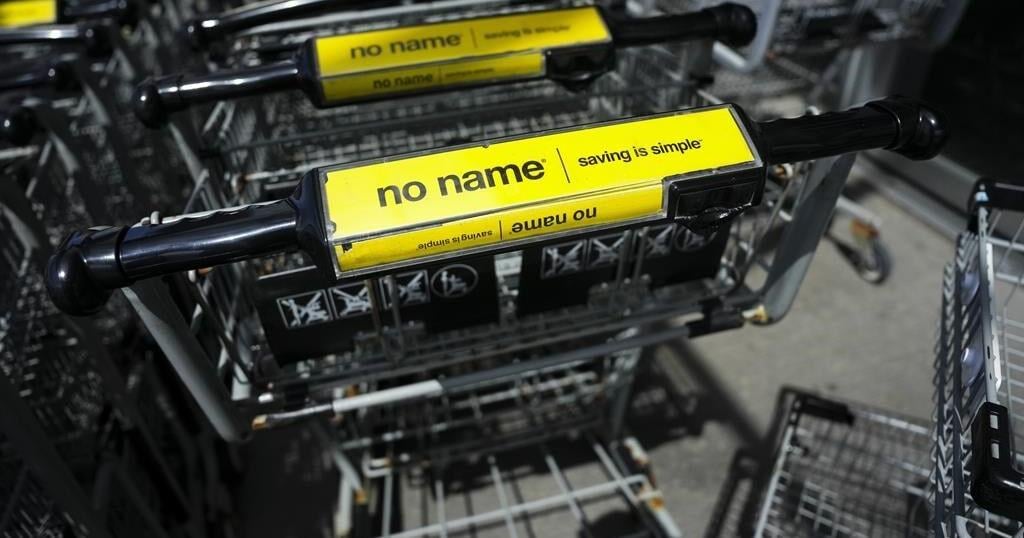Loblaw is piloting a new ultra-discount grocery store in Ontario that promises to deliver even lower prices by stripping away even more frills.
The first three No Name stores will open in September in Windsor, St. Catharines and Brockville, capitalizing on Loblaw’s existing discount brand known for its simplified, bright-yellow packaging and marketing.
“The No Name store is a completely different shopping experience,” Loblaw president and CEO Per Bank said in an interview.
“Running a traditional grocery store can be expensive, but by reducing our building and operating costs, as well as the overall complexity of the store, we do believe that we can deliver meaningful savings.”
It’s the latest discount concept launched by the grocer, after opening smaller-format versions of its No Frills discount banner earlier this year.
Discount grocery stores have been driving sales growth for all of Canada’s major grocers as shoppers hunt for deals to keep a lid on their grocery bills.
Loblaw has been investing in its discount store network by opening new stores and converting others. The company and the industry as a whole have been under pressure from consumers and politicians to stabilize or lower food prices after a bout of inflation left grocery costs more than 20 per cent higher over three years.
The No Name stores will be less complicated to run, the company says — in part because they will have less variety with about 1,300 individual products, compared with up to 7,000 products at the smaller-format No Frills locations.
“We are trying to make it as simple as possible,” Bank said.
“If this works, we will accelerate, and if not, we will pivot and, importantly, take the learnings and apply them somewhere else.”
The stores will have shorter operating hours from 10 a.m. to 7 p.m., limited marketing and no flyers. Shoppers will find a small range of frozen items, packaged bakery items, produce and pantry staples, but no refrigerated foods like dairy or fresh meat.
The company says it is relying on reused fixtures such as shelves and cash lanes to reduce costs. It will have no self-checkouts, at least to begin with, said Bank. The streamlined product selection also means less waste, he added.
Building these stores will take about 10 to 20 per cent of the cost of a new regular-sized No Frills store, said Bank, giving the company more room to cut costs for customers.
Prices at the store will be up to 20 per cent cheaper than comparable products at nearby discount stores, including its own No Frills stores, with more than three-quarters of the products more than 10 per cent cheaper, said Bank.
Two-thirds of the products will be below $5, he said, and just under 60 per cent will be No Name or President’s Choice brands.
The idea stems from before Bank joined Loblaw late last year. When energy prices were on the rise in Europe a few years ago, he decided to test out this kind of smaller, simplified store at Salling Group with a hard discount banner called Basalt in Denmark, which launched in late 2022.
The concept didn’t pan out there, shutting down after seven months, but Bank believes the idea has legs in Canada.
One of the biggest struggles for Basalt in Denmark was that shoppers were reluctant to visit more than one store, said Bank, which the No Name store concept relies on.
Canada also has a wider customer base for the stores, he said, and No Name is already a widely recognizable brand.
Within six months, Bank expects to have a good idea of whether the concept is working.
He sees discount being a “growth engine” in the coming years for Loblaw, from No Frills and Maxi stores, smaller-concept No Frills locations, and potentially these new No Name stores.
Bank says he feels he’s brought a focused strategy for discount to the company, but also a “test and learn” approach that’s evident in the company’s recent discount ventures.
“We’re not afraid of testing new ideas,” he said.
This report by The Canadian Press was first published Aug. 22, 2024.
Companies in this story: (TSX:L)

























